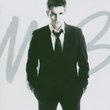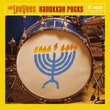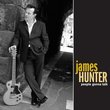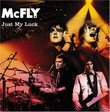| All Artists: Vittorio Grigolo Title: The Italian Tenor Members Wishing: 0 Total Copies: 0 Label: SONY MASTERWORKS Original Release Date: 1/1/2010 Re-Release Date: 10/5/2010 Genre: Classical Style: Opera & Classical Vocal Number of Discs: 1 SwapaCD Credits: 1 UPCs: 886977525728, 886977525728 |
Search - Vittorio Grigolo :: The Italian Tenor
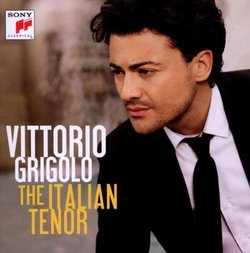 | Vittorio Grigolo The Italian Tenor Genre: Classical
Vittorio Grigolo purposely waited to record his first operatic solo album until he had something unique to communicate in the repertoire and has chosen arias representing the culture I come from. THE ITALIAN TENOR presents... more » |
Larger Image |
CD DetailsSynopsis
Product Description Vittorio Grigolo purposely waited to record his first operatic solo album until he had something unique to communicate in the repertoire and has chosen arias representing the culture I come from. THE ITALIAN TENOR presents music from three giants of the lyric stage Gaetano Donizetti, Giuseppe Verdi and Giacomo Puccini and combines famous arias with lesser-known discoveries. The album was recorded in the Teatro, Regio di Parma with the resident orchestra and conductor Pier Giorgio Morandi. Donizetti's Una furtiva lagrima (L'Elisir d'Amore) has been a litmus test of the Italian tenor since the days of Enrico Caruso, whose famous performance of the aria paved the way for the opera's return to the repertoire after years of neglect. Equally beautiful is Spirto gentil (La Favorita) in which the lead character laments the loss of his love forever. The disc presents Vittorio as five Verdi characters. His selection begins with Quando le sere al placido from Luisa Miller and continues with Ella mi fu rapita and Possente amore from Rigoletto. Verdi s early opera Il Corsaro is rarely performed on stage today, but the young tenor triumphed in the title role at the Zürich Opernhaus earlier this year. The arias Tutto parea sorridere and Si de Corsari il fulmine give him ample opportunity to demonstrate his lyric and dramatic gifts, as does the one chosen aria from Un Ballo in Maschera, the introspective Forse le soglia attinse....ma se m'e forza perderti . Following the cavatina Ah si ben mio coll essere , Vittorio makes a rare venture into the spinto tenor repertoire with Di quella pira (Il Trovatore). The Puccini selection features a seldom heard aria from the composer's first opera, Le Villi, Ecco la casa...torna ai felici di . Vittorio was drawn to the unusually dark, almost Wagnerian colours of the piece. Donna non vidi mai (Manon Lescaut), sung at the beginning of the opera as des Grieux falls in love with the young Manon, provides a clear contrast to the despair of Cavaradossi in E lucevan le stelle (Tosca) as the painter awaits his execution. The aria Firenze è come un albero fiorito from Puccini's only comic opera, Gianni Schicchi, foreshadows the melody of the celebrated O mio babbino caro in its central section. Of course, no survey of the Italian tenor repertoire would be complete without the best-loved aria of them all - Che gelida manina (La Bohème). Similarly Requested CDs
|
CD ReviewsVIVA VITTORIO Bartolome Mesa Gil | Malaga, SPAIN | 10/06/2010 (5 out of 5 stars) "A tenor for the ages? It's too soon to tell. But this must be one of the most extraordinary operatic debut albums in a very long time (he had recorded previously just a nice but sugary easy listening record with kind of pop tunes). The test for any tenor of course is the opera house, but if Grigolo sounds half as well live as he does here, we have reasons for celebration. He was quite good in the live telecast of Rigoletto from Modena, where he sung the Duke opposite the jester of Plácido Domingo, but he is superb here in his scene from the third act of that opera, managing to sound tender and forceful, with the contrasting impulses of love and lust wisely balanced. He has chosen for this disc mainly very well known arias from the Italian repertoire, but makes them sound fresh and almost new. This is particularly true of the aria from Luisa Miller (sung most of the time with a beguiling mezzavoce in an unusual interpretation that just sounds right), but equally personal and impressive are his renderings of warhorses such as Che gelida manina (radiant with the excitement of first sight love), Una furtiva lagrima (sung beautifully straightforward as a sight of the soul) or the emotional but restrained (no hint of the usual self pity) farewell to life of Cavaradossi. The arias and cabalettas from Il Corsaro and Trovatore are both tender and heroic respectively. The less known arias from Gianni Schicchi and Le Villi in his ringing tone are quite a revelation. A full lyric tenor, in all the tracks the fiato, the shading and the phrasing show a good technique, while the voice is young and beautiful. But it is the unique artistry behind it what sets Grigolo apart. A singer to watch." A Beautiful But Very Young Voice Good Stuff | 10/06/2010 (4 out of 5 stars) "I love a review of a tenor when the worst complaint the "critic" can come up with is about his low notes. LOL!! This is a very young man (33) at the edge of what I think just might be an international explosion of a career. How long that career lasts is very much up to him. The fact that he includes Manrico's high-C dripping music from "Il Trovatore" is already cause for concern. That is music he can look at five years from now. Maybe. I'm not even sure I would want him singing Rodolfo just yet. His voice, which is actually quite beautiful, needs time to mature and grow naturally into whatever it is going to finally be. Judging from this recital and a couple of other things I have heard him in (none, alas, in person) he seems to be in the possession of a rather beautiful instrument, and seems to have a fair amount of musicality in his nature. So much the better. Signor Grigolo should continue to develop for the next few years in those smaller houses which dot the European continent. He should resist, at all costs, being enticed to come to America and parade his stuff, like a trained seal, in one of American's Great Big 3000 Seat Singing Barns, like - dare I say it - the Met. Don't go west, young man. Not yet. We'll still be here when you're ready." Wrong repertoire for his voice D. Lee Edwards | Los Angeles, CA USA | 10/08/2010 (2 out of 5 stars) "Vittorio Grigolo sings these arias well enough, and with a good deal of subtlety, standing 3 feet behind a microphone but I seriously question whether they would work in the theatre given his slender lyric voice. Already on his first operatic solo CD he is trying the dramatic tenor repertoire. One wonders what sort of coaching and career management he is using which steers him in this direction because it will not bode well for a long career given his instrument which could soon wear out. I believe the correct classification of his voice is tenore de grazia: a sweet lyric timbre which is capable of passionate intensity but always within the lyric repertoire. His is not a voice for Cavaradossi in Tosca or Manrico in Trovatore. For that, listen to Franco Corelli or Placido Domingo, both of which have a strong core to their mid-voice appropriate for Verdi's heavy parts. It's as if Grigolo has taken his cues from his compatriot Andrea Bocelli who has been recording opera wildly inappropriate for his voice, but he is allowed to do it because he is so popular. I was disappointed in this vocal recital for that reason. It sounds inauthentic and not what one would hear in the theatre. Grigolo would do well to follow in the footsteps of his other compatriot--another tenore de grazia--Tito Schipa, whose sweet, plangent lyric voice carried him through a long career with great distinction. Schipa sang very little Verdi and Puccini. He wisely sang mostly bel canto such as Sonnambula, Don Pasquale, L'Elisir D'Amore, Massenet, Thomas, Delibes, a lot of French opera along with Italian song such as from Scarlatti."
|

 Track Listings (15) - Disc #1
Track Listings (15) - Disc #1